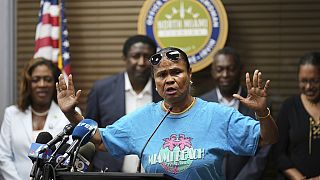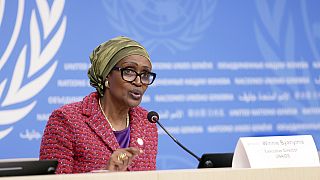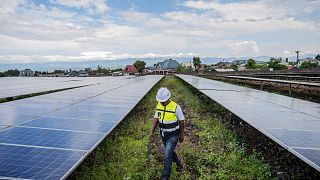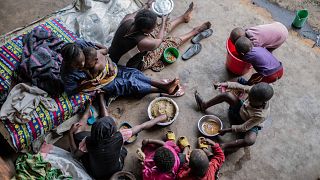Democratic Republic Of Congo
Papa Wemba, the African music icon known around the world as the king of Congolese rumba has finally been buried on Wednesday at a cemetery in the capital of his native Democratic Republic of Congo.
Before the burial ceremony, thousands of Congolese and people from all walks of life attended his funeral on Wednesday morning. The outpouring of emotions clearly showed that Jules Shungu Wembadio Pene alias Papa Wemba has left an entire continent in an acute state of sadness.
More than 15,000 people gathered outside, and 2,000 inside, the Notre Dame Cathedral in Kinshasa for the funeral service.
Papa Wemba, known as the“king of Congolese Rumba”who died in Abidjan on 24th April 2016,was buried today in Kinshasa pic.twitter.com/lVEQXFyjK1
— MONUSCO (@MONUSCO) May 4, 2016
“Today, I saw the population of Congo mobilise themselves to come and mourn Papa Wemba. We were all here for him, and together, we are grateful for what he did for us. I personally worked with him for 18 years, and he appointed me his personal spokesperson. I often spoke on TV on his behalf. He was fair and honest, a simple person who never wanted to hurt anyone,” said Jean Gomair who has been Papa Wemba’s spokesperson.
In the words of Cardinal Laurent Monsengwo, “For three days, as one man, the Congolese people, Africa and the world mourn the man who came to be known as the father of Congolese rumba.”
Follow the funeral ceremony of #PapaWemba on https://t.co/h07ZvLTdhg
africanewsand africanewsfr #RIPPapaWemba https://t.co/8ERuy1HGxl— africanews (@africanews) May 4, 2016
Members of the clergy, officials of government, local celebrities and family members gathered near his coffin which was draped in a Congolese flag before going to his burial site about 50 kilometers from the capital.
A steady stream of mourners filed past his white and gold casket in the three days before Wednesday’s burial as it lay in state at Democratic Republic of Congo’s parliament building in the capital Kinshasa.
It rained after the burial — a sign of a blessing in the country.
Media reports have it that Kinshasa mayor Andre Kimbuta announced that a mausoleum will be built in Wemba’s honor. “I salute the master of art, a man of talent and genius,” he said.
The mausoleum will be in addition to a posthumous National Order conferred on him by President Kabila on Monday plus plans by the Cultural Minister of the DRC that a theatre was to be built to honor Wemba.
Wemba’s daughter, Kadi Shungu, described him as “a loving father, affectionate, very generous and with a legendary hospitality.”
The singer, songwriter and actor, delivered his last performance in Abidjan late last month during an urban music festival (FEMUA) it was on the same stage that Wemba slumped and died, a death that according to his last interviews he had wished for.
May 4 was long and painful for many fans who came from around the world to make the final tribute to the king of rumba.
The 66-year-old musician’s artistic life has been celebrated with performances, ceremonies and parades since Monday.
Papa Wemba rose to fame in the Congolese capital of Kinshasa during the 1970s with the band Zaiko Langa Langa, whose guitar-based fusion of Latin and African dance styles inspired a generation of African musicians.
He founded Viva la Musica, the band he would continue to perform with until his death despite periods of solo work and collaboration with other artists.
He moved to Paris in the 1980s and helped popularize Congolese music beyond Africa.
Already a household name in his home country, then known as Zaire, Wemba met Peter Gabriel in the early 1990s as the British singer and composer was beginning to promote and produce artists from around the globe as part of the burgeoning world music movement.
He would remain among Africa’s most popular artists and continue to tour internationally until his death.
Wemba was also known as the Pope of Sape, a movement of fashion dandies deriving its name from the French acronym for the Society of Ambiance-Makers and Elegant People.
Wemba sang the praises of the sapeurs, whose impeccable appearance and penchant for designer label garments are a stark contrast to the gritty, impoverished environment in which they often exist.
Who is #PapaWemba?
— Alfa Ibn #Leicester (AlfaAllahguide) May 5, 2016akweiakweiof africanews profiles the late music icon https://t.co/E0nSVsaD3B FYIniismartpic.twitter.com/yl9GYAwQU8












00:51
Liberia's former president William Tolbert symbolically reburied, 45 years after his murder
00:52
Jury deliberating in Sean ‘Diddy’ Combs’ sex trafficking trial
Go to video
Families grapple with life in the wake of the Israel-Iran Conflict
00:52
South African court halts burial of Zambia’s ex-president Edgar Lungu
01:00
Animal shelters in the US use live music to soothe anxious pets
01:05
Pharrell Williams presents Spring/Summer 2026 collection for Louis Vuitton